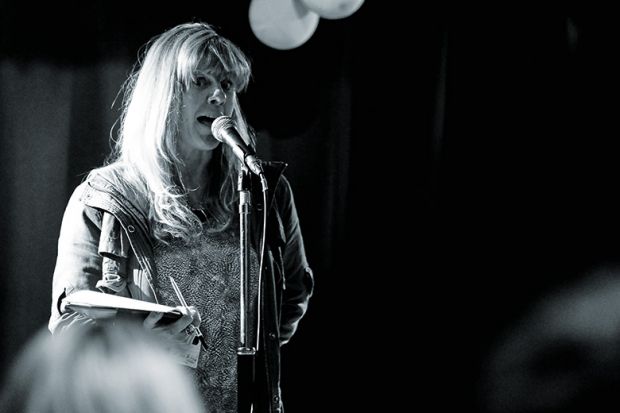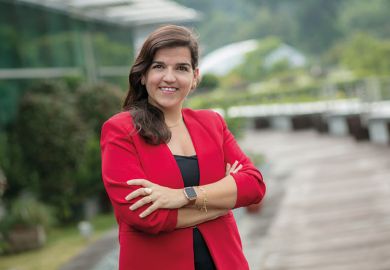Sam Beale is senior lecturer in theatre arts at Middlesex University. She has worked as a stand-up comedian, comedy writer and events manager and was asked by the comedian Mark Thomas to help teach the performers for a comedy show he was planning in the refugee camp at Jenin, in the West Bank. She is also part of the team behind Thomas’ new show, Showtime From The Frontline, which is currently touring the UK, including an extended run at London’s Theatre Royal Stratford East from 10 to 21 April.
Where and when were you born?
On the west coast of Scotland in 1968.
How has this shaped who you are?
I spent all my childhood summers in Crinan pretending that I loved the taste of salty, lumpy porridge, earthy brown trout and eel to impress my grandpa, who I adored. I’m not sure how this shaped me, but I am happiest when I’m either by or in a very cold sea with a bitter wind blowing.
What was your most memorable moment at university?
My year group was active in the 1991 student occupations against the freezing of grants and the introduction of top-up loans, so most of my third year was taken up with occupying university buildings and campaigning and chanting outside various government departments. I think that the most memorable moments occurred during the cabaret gigs we ran to keep our spirits up. Cabaret performers, musicians and comics came to perform with us at our dingy basement gigs, and I loved it.
How did you get into stand-up comedy and then events management?
After graduating it seemed natural to form a cabaret group with a small group of friends and perform and run our own nights, booking established acts and performing new material. I was also inspired to get involved in the various mid-1990s campaigns against Michael Howard’s draconian criminal justice bill and organised lots of benefit gigs around the country.
How did you combine that with a burgeoning academic career?
The academic career was entirely accidental. I taught as a visiting lecturer on the first named undergraduate stand-up comedy module in the country, which was started at Middlesex by Arthur Husk and Huw Thomas. The university then employed me for a while as a comic performance researcher. This was a part-time post and it was an ideal job to combine with finding and booking acts and running comedy/cabaret stages. Gradually my teaching and research interests developed and took precedence.
To what extent do you believe that comedy can be taught?
Given that it’s been my job for 20 years, it will come as no surprise that I think you can teach it to quite a large extent! The teaching I do at Middlesex has evolved directly from Arthur and Huw’s combination of encouraging students to watch and analyse comedians [and] practical explorations of comic approaches and techniques in workshops. At the root of this approach is the belief not that you can teach someone to be funny, but that everyone already has a distinct comic voice and that – if they want to perform – what they can learn are the most effective ways to articulate this voice and share with an audience their unique perspective on their life, society and culture.
Do you see any parallels between 'performing' as a lecturer and performing on stage?
Teaching is definitely my kind of performance. The audience is captive, you can mark them absent if not enough of them turn up and, best of all, they tend to be motivated to laugh at your jokes because you are grading them.
How did you get involved in Mark Thomas’ plans to create a comedy show in Jenin?
I’ve known Mark since the early 1990s when we did lots of benefit gigs together and I worked as a researcher on his Channel 4 series The Mark Thomas Comedy Product. For the Jenin project he rang me out of the blue and it was such a ludicrous idea that I couldn’t say no: teaching stand-up comedy in a language I don’t speak to students living in a refugee camp in an occupied territory? That’s hilarious!
What were your initial impressions of Jenin?
My first impressions were of a community of friendly and incredibly hospitable people getting on with their lives in a normality that is never reliably stable and is prone to random incidents of violence and military intervention. Before we got to Jenin I was most concerned that we would be faced with a level of censorship that would be in direct opposition to the fundamentals of the stand-up form. However, of course, the more taboos there are in any context, the more jokes there are to find, and – for the students inside the workshops at least – censorship was not an issue.
How might your Jenin experience feed back into your day job at Middlesex?
It has reinvigorated my belief in the power of comedy to offer alternative ways of looking at our lives, and refreshing perspectives on our experiences, culture and society.
How have you contributed to Thomas’ new British tour?
My role as a teacher in Jenin evolved into that of a comedy consultant/director in London during the rehearsal period for Showtime From The Frontline. I have also worked with Faisal [Abualheja] and Alaa [Shehada, the two Palestinian performers] to shape their stand-up sets for British audiences.
If you were the universities minister for a day, what policy would you immediately introduce to the sector?
Well, in that (thankfully) extremely unlikely event, which could only be even vaguely imaginable in a Corbyn government, I would take enormous pleasure in abolishing fees. Don’t ask me what I’d do next, as I’d spin this decision out for most of the day to ensure that it was not my problem.
Do you live by any motto or philosophy?
I’m afraid it has to be: “Fuck ‘em if they can’t take a joke.” (Variously attributed to Mae West, Sophie Tucker and Bette Midler.)
matthew.reisz@timeshighereducation.com
Appointments
Lawrence Bacow will become the 29th president of Harvard University on 1 July. Currently the Hauser leader-in-residence at the Harvard Kennedy School of Government’s Center for Public Leadership, Dr Bacow served for 10 years as president of Tufts University. This followed 24 years at the Massachusetts Institute of Technology, where he served as chancellor, chair of the faculty and professor of environmental studies. Dr Bacow said that he was “humbled and honoured” by the opportunity to lead the institution. “The Harvard I have known has always stood for at least three things: the pursuit of truth, an unwavering commitment to excellence, and opportunity,” he said.
Jon Platts has been named dean of Cardiff Metropolitan University’s Cardiff School of Technologies. Professor Platts, who founded the engineering consultancy firm Muretex in 2003, has worked with a range of organisations on complex engineering and technology projects such as the BAE Systems Taranis unmanned aircraft and also with many international academic and national defence -institutions.
Caroline Kennedy-Pipe has taken up the post of professor of international relations and international security at Loughborough University. Professor Kennedy-Pipe, who joins from the University of Hull, has interests in the history of the Cold War, counterterrorism policy and new security challenges.
Lord Willetts has been appointed chancellor of the University of Leicester. The former universities and science minister, who is an honorary graduate of the university, will succeed Lord Grocott as the university’s seventh chancellor in July.
Ryan Johnston will be the inaugural director of the University of Melbourne’s Buxton Contemporary, the new purpose-built home for the Michael Buxton Collection, which acquires works of art by leading Australian artists. Mr Johnston has more than 15 years’ experience as a director, a curator and a lecturer
at the University of Melbourne.
Register to continue
Why register?
- Registration is free and only takes a moment
- Once registered, you can read 3 articles a month
- Sign up for our newsletter
Subscribe
Or subscribe for unlimited access to:
- Unlimited access to news, views, insights & reviews
- Digital editions
- Digital access to THE’s university and college rankings analysis
Already registered or a current subscriber?




